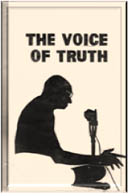
P.O. SEVAGRAM, DIST.WARDHA 442102, MS, INDIA. Phone: 91-7152-284753
FOUNDED BY MAHATMA GANDHI IN 1936
THE SELECTED WORKS OF MAHATMA GANDHI
Vol-5 : Voice of Truth

VOICE OF TRUTH
from
Selected Works of Mahatma Gandhi
Volume V
Written by : M. K. Gandhi
Table of Contents
PART I : SOME FAMOUS SPEECHES
- Benaras Hindu University Speech
- Statement in the The Great Trial of 1922
- On the Eve of Historic Dandi March
- Speech At The Round Table Conference
- The ‘Quit India’ Speeches
- Speech Before Inter-Asian Relations Conference
- Speech On The Eve Of The Last Fast
PART II : SELECTIONS
- SECTION I : TRUTH, WORLD AND MAN
- SECTION II : MEANS AND ENDS
- 7. Means and Ends
- 8. The Meaning of Non-violence
- 9. The Law of Human Species
- 10. The Power of Non-Violence
- 11. Qualities of Votaries of Non-violence
- 12. Non-Violence and Cowardice
- 13. What is Satyagraha
- 14. Qualifications and Training of a Satyagrahi
- 15. Non-co-operation
- 16, Civil Disobedience
- 17. Fasting in Satyagraha
- 18. Satyagrahi Leader
- 19. Satyagraha in The Face of Riots and Aggression
- SECTION III : COMPARATIVE IDEOLOGIES
- SECTION IV : ONE WORLD
- SECTION V : RELIGION AND CULTURE
- SECTION VI : ART, LITERATURE AND SCIENCE
- SECTION VII : ECONOMIC IDEAS
- 35. Economics and Ethics
- 36. Supremacy of Man : Full Employment
- 37. Plain Living and High Thinking
- 38. Dignity of Labour : Bread Labour
- 39. Swadeshi
- 40. Economic Equality
- 41. Decentralised Economy
- 42. Village Communities
- 43. Self-Sufficiency
- 44. Co-operation
- 45. Trusteeship
- 46. The Evil of Industrialism
- 47. The Place of Machinery
- 48. Khadi and Hand-Spinning
- 49. Village Industries
- SECTION VIII : LABOUR RELATIONS
- SECTION IX : POLITICAL IDEAS
- 55. Politics and Religion
- 56. The State of Enlightened Anarchy
- 57. The Individual is Supreme
- 58. Swaraj
- 59. True Democracy
- 60. Decentralisation
- 61. Village Panchayats
- 62. Parliamentary Democracy
- 63. Franchise and Voters
- 64. The Seat of Real Power
- 65. Legislatures
- 66. Majority and Minority
- 67. A Code of Conduct for Governors and Ministers
- 68. The Popular Ministers
- 69. The Police, Crimes and Jails
- SECTION X : SOCIAL IDEAS
- SECTION XI : BASIC EDUCATION AND STUDENTS
- SECTION XII : UNTO THIS LAST
- Glossary
- Sources
About This Book
Written by : M. K. Gandhi
General Editor : Shriman Narayan
First Edition :10,000 copies, February 1959
I.S.B.N :81-7229-008-X
Published by : Shantilal H. Shah
Navajivan Trust,
Ahemadabad-380014
India
Printed by : N. M. Kothari at Rang Bharati,
Todi Estate,
Sun Mill Compound,
Lower Parel,
Bombay-400013
India
© Navajivan Trust, 1969
Download
SECTION IX : POLITICAL IDEAS
Chapter- 60. Decentralization
Centralization as a system is inconsistent with non-violent structure of society.
Harijan, 18-1-42, p. 5
The centre of power now is in New Delhi, or in Calcutta and Bombay, in the big cities. I would have it distributed among the seven hundred thousand villages of India.
Mahatma Gandhi the last Phase, Vol. 2, (1958), p. 614
In this structure composed of innumerable villages, there will be ever widening, never ascending circles. Life will not be a pyramid with the apex sustained by the bottom. But it will be an oceanic circle whose center will be the individual always ready to perish for the village, the latter ready to perish for the circle of villages, till at last the whole becomes one life composed of individuals, never aggressive in their arrogance but ever humble, sharing the majesty of the oceanic circle of which they are integral units.
Therefore, the outermost circumference will not wield power to crust the inner circle but will give strength to all within and derive its own strength from it. I may be taunted with the retort that this is all Utopian and, therefore, not worth a single thought. If Euclid’s point, though incapable of being drawn by human agency, has an imperishable value, my picture has its own for mankind to live. Let India live for this true picture, though never realizable in its completeness. We must have a proper picture of what we want, before we can have something approaching it. If there ever is to be a republic of every village in India then I claim verity for my picture in which the last is equal to the first or, in other words, no one is to be the first and none the last.
Harijan, 28-7-46, p. 236